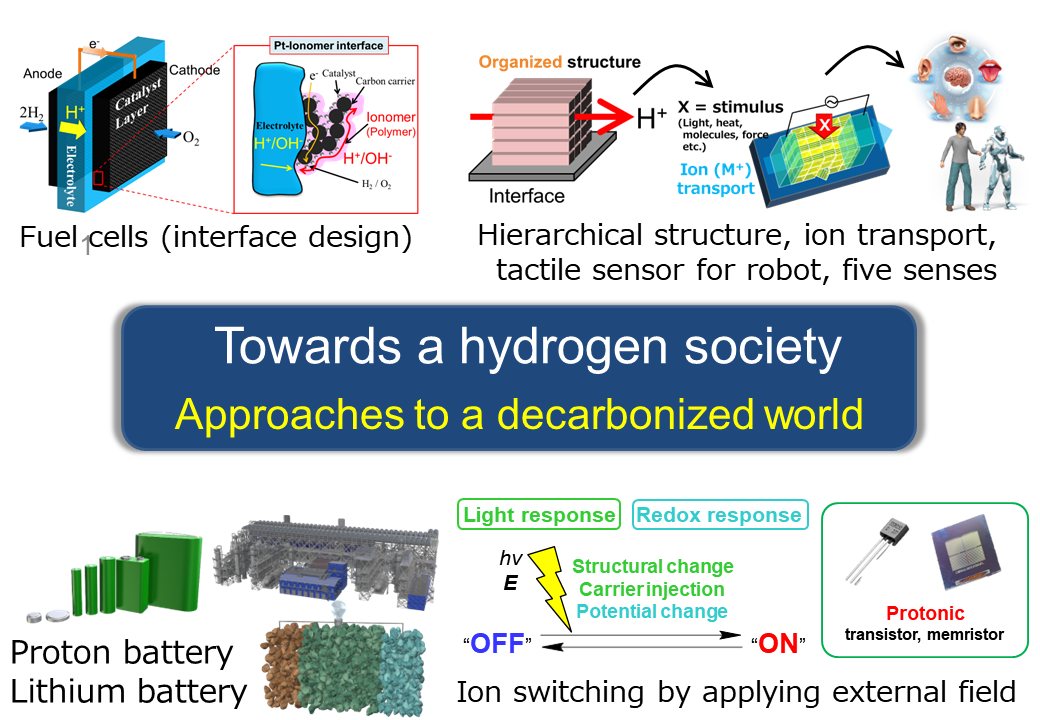
Innovating for a Greener Future through Advanced Materials Science
Laboratory on Energy Nanomaterials
Professor:NAGAO Yuki
E-mail:
[Research areas]
Protonics, Polymer Chem., ElectroChem. Coordination Chem., Surface Chem.
[Keywords]
Proton Conductive Materials, Self-assembly, Electrochemical Catalysts, Fuel Cells, Energy Conversion, Sensors, Battery
Skills and background we are looking for in prospective students
Our group respects your diverse research background. We are looking for students who can keep a high motivation to tackle new research while demonstrating your strengths. It is vital to create a laboratory where research staff and students can share the spirit of co-prosperity.
What you can expect to learn in this laboratory
Through twice a week seminars conducted in English, specifically research discussion and literature introduction, you will acquire the ability to examine and think oneself, with the help of supervisor and seniors. As a practice opportunity, you will study on polymer chemistry, surface chemistry, electrochemistry, coordination chemistry etc. You also acquire following things. 1. Problem discovery and solution method. 2. Material synthesis and various analytical methods. 3. Interpretation method of data based on logical thinking and presentation skill.
【Job category of graduates】
University faculty in home country, Chemical company, Energy company
Research outline
Securing diverse energy resources is an urgent issue for resource-poor Japan to achieve sustainable development. And it is a dream of mankind to create hydrogen and oxygen from common water, and to create carbon materials using carbon dioxide as a resource. A hydrogen society is necessary for the decarbonized society that is rapidly progressing in the world. We are researching ion-conducting polymer materials, inorganic materials, and organic-inorganic hybrid materials using interfaces that can be applied to fuel cells, batteries, and sensors that support the hydrogen society. Let's contribute to a hydrogen society together with us.
Research Themes
- Research on fuel cell performance improvement
Proton transport property in polymer organized structure
OH- ion transport property in polymer thin films - Research on Li ion battery performance improvement
Precise polymer arrangement for electrolyte-electrode interface - Rechargeable proton batteries
- Research on external force response sensors using ion transport
- Ion switching by coordination compounds (Dr. Aoki, Assistant Professor)


Fig. 1 Schematic of our research. Materials science for development of polymer electrolyte
fuel cells, batteries, tactile sensor, and ion switching.
Key publications
- Honbo, Y. Ono, K. Suetsugu, M. Hara, A. Taborosi, K. Aoki, S. Nagano, M. Koyama, Y. Nagao, Effects of Alkyl Side Chain Length on the Structural Organization and Proton Conductivity of Sulfonated Polyimide Thin Films, ACS Appl. Polym. Mater., 6, 13217 - 13227 (2024).
- Y. Nagao, Proton-Conducting Polymers: Key to Next-Generation Fuel Cells, Electrolyzers, Batteries, Actuators, and Sensors (Review), ChemElectroChem, 11, e202300846 (2024).
- Y. Nagao, Advancing Sustainable Energy: Structurally Organized Proton and Hydroxide Ion-Conductive Polymers (Review), Curr. Opin. Electrochem., 44, 101464 (2024).
Equipment
Material analyzer (IR, UV-Vis, NMR, GPC, XRD, TG-DTA)
Electrochemical equipment (LCR, CV, in situ QCM, fuel cell, battery test system)
Surface analyzer (XPS, in situ GIXRS, XRR, white interference, AFM)
Molecular orientation analyzer (IR, pMAIRS, polarized microscope)
External synchrotron and neutron experiments
Teaching policy
We do not set core time, but encourage you to do experiments basically from 9am to 5pm. The research topic will be determined in consultation with the research staff. We expect the following to our students: 1) to learn through cutting-edge research; 2) to improve your communication skills to facilitate your research; 3) to refresh as much as possible on weekends for leading a fulfilling life; 4) to actively interact with outside researchers.
Seminars are held twice a week, research discussion and journal paper introduction meetings. Once a month, a joint presentation meeting is held with laboratories from other universities. Conference presentations and publications are encouraged. Financial support is provided for contributions to laboratory operations and collaborative research.
[Website] URL : https://www.jaist.ac.jp/ms/labs/nagao-www/?lang=en